ITU-D ICT Applications and Cybersecurity Division Publications
|
|
|
 IMPACT
(International Multilateral Partnership Against Cyber Threats) IMPACT
(International Multilateral Partnership Against Cyber Threats)
On 8th September 2011, IMPACT has
formally become the cybersecurity executing arm of the United
Nations’ (UN) specialised agency -International Telecommunication
Union (ITU) in a landmark agreement that was signed during the World
Summit for Information Society 2011 (WSIS) Forum in Geneva, May
2011. IMPACT is tasked by ITU with the responsibility of providing
cybersecurity assistance and support to ITU’s 193 Member States and
also to other organisations within the UN system. The Memorandum of
Agreement was officially signed by ITU Secretary-General Dr.
Hamadoun Touré and Datuk Mohd Noor Amin, Chairman of IMPACT at the
ITU’s head office in Geneva. Founded in 1865, ITU is the oldest
organisation within the UN system and functions as the UN’s
specialised agency for information and communication technologies.
IMPACT’s involvement with ITU began in 2008 when it was chosen as
the physical home of ITU’s Global Cybersecurity Agenda (GCA). The
GCA is an international cybersecurity framework that was formulated
following deliberations by more than 100 leading experts worldwide.
The GCA contains many recommendations, which when adopted and
appropriately implemented, would result in improved cybersecurity
for the global community of nations. Through a Memorandum of
Understanding inked back in 2008, ITU made IMPACT the physical home
of the GCA and had tasked IMPACT with the responsibility to
operationalise the various initiatives under the GCA. In addition to
this, during the 2011 WSIS Forum, a Memorandum of Understanding (MoU)
was signed between ITU and the United Nations Office on Drugs and
Crime (UNODC) which will see IMPACT playing a pivotal role in
supporting both organisations in their collaboration to assist UN
member states mitigate risks posed by cybercrime. IMPACT’s Global
Response Centre (GRC) acts as the foremost cyber threat resource
centre for the global community and provides emergency responses to
facilitate identification of cyber threats and sharing of resources
to assist ITU-UNODC Member States. Since its establishment back in
2008, IMPACT serves as a politically-neutral platform which brings
together governments, industry and the academia to enhance the
global community’s capabilities in dealing with cyber threats.
[Continue reading about this document] |
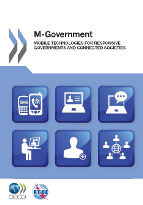
M-Government: Mobile Technologies for Responsive Governments and
Connected Societies (ITU, OECD 2011)
This report aims to foster a
better understanding on how to leverage the economic and social
impacts of the use of mobile technologies and applications to enable
ubiquitous governments, sustain public sector innovation and
transform public service delivery. The report is a joint-product of
the collaboration of International Telecommunication Union (ITU),
the Organisation for Economic Co-operation and Development (OECD)
and the United Nations Department of Economic and Social Affairs (UNDESA).
[Continue reading about this report.]
|
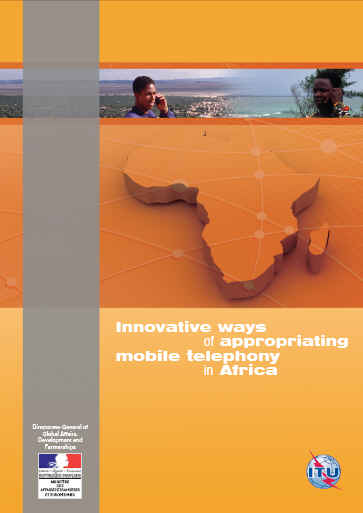
Innovative ways of appropriating mobile telephony in Africa
The democratization of mobile telephony in Africa, its availability, ease of use and, above all, the extent to which it has been appropriated by the public, have made it a major success story. Very low-income populations are not only actively demanding access to mobile telephone services but also innovating, by creating the functions and applications they can use. Development is thus happening “from the bottom up” and an entire economy, both formal and informal in nature, has come into being to meet people’s needs. Many different actors – private, public, NGOs – are now mobilized.
Operators and manufacturers have successfully changed their economic model and adapted their products and applications to allow access to services at affordable prices. NGOs have in addition created a range of messaging- based services in different sectors. However, the future evolution of mobile telephony is not clear. A range of different approaches will co-exist, from SMS up to full Internet capacity, including experimental initiatives using smart phones and “netbooks”. Falling costs will lead to an increase in the number of phone devices with data receiving capacity. Individuals and companies involved in creating services or applications for development will need to take account of their users’ demographics and incomes, as well as the pricing systems of telecommunication companies in countries where they wish to operate. In this, States and regulating authorities have grasped the crucial role which they must play in promoting an investment-friendly environment with the goal of achieving universal access and stimulating innovation – key factors in achieving a “critical mass” of users.
This report takes stock of developments in this sector, which is crucial to Africa’s economic development, and suggests a number of possible directions it might take.
... [Continue reading about this report.]
|
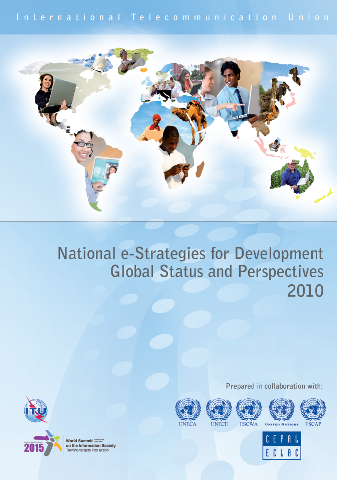
National e-Strategies for Development, Global Status and Perspectives, 2010
The report National e-Strategies for
Development, Global Status and Perspectives, 2010 is a publication
in the framework of the World Summit on the Information Society (WSIS)
on the occasion of the fifth anniversary of the WSIS’s Tunis phase
and the adoption of the Tunis Agenda for Information Society. The
Report reviews the progress in the elaboration of comprehensive,
forward-looking and sustainable national e-strategies, and makes
recommendations on policies and measures. This includes ICT
strategies and sectoral e-strategies as an integral part of national
development plans and poverty reduction strategies, as was called
for by the Tunis Agenda for the Information Society... [Continue reading about this report.]
|
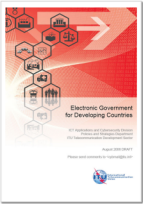
Electronic Government for Developing Countries
The purpose of this report is to examine the adoption of e-Government services in countries with developing economies. The day-to-day business of government is built on information. Information is a critical resource that helps to ensure the accountability of government, enables governments to manage its operations, and allows the public to participate in the governance of their country. With the revolutionary changes that ICTs are bringing to our global society, governments worldwide continue to develop more sophisticated ways to digitize its routines and practices so that they can offer the public access to government services in more effective and efficient ways. Across the world, 173 of 190 countries use the Internet to deliver government services. These activities are broadly referred to as digital government, which is an "umbrella term that comprises all uses of information and telecommunication technologies in the public sector" (Garson p. 18). E-Government focuses on the utilization of information and communication technologies (ICT) to deliver government services. E-Government is part of other closely related efforts in digital government. This report examines e-Government, although some examples could be regarded as e-governance initiatives... [Continue reading about this report.]
|
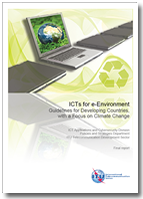
ICTs and e-Environment
This report, ICTs and e-Environment, reviews key ICT trends and provides an overview of the impact that ICTs have on the environment and climate change as well as their role in helping mankind to mitigate and adapt to these changes. The report approaches the issues from a development perspective and is based on consultations with key actors and extensive online research. The ICTs and e-Environment report documents current activities and initiatives and makes a set of recommendations for strengthening the capacity of developing countries to make beneficial use of ICTs to mitigate and adapt to environmental change, including climate change. [Continue reading about this document.]
|
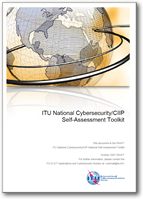
ITU National Cybersecurity/CIIP Self-Assessment Tool
Information infrastructures have long been subject to national policies, procedures and norms. National government agencies and institutions exist to implement and oversee these activities, and the responsibility for the operation and management of information infrastructures has traditionally been shared among government, owners and operators, and users. Protection of the information infrastructure (formerly the PSTN network) has been a longstanding concern of member states and the work of the ITU is testimony to this concern. However, the use of information systems and networks and the entire information technology environment have changed dramatically in recent years. These continuing changes offer significant advantages but also require a much greater emphasis on security by government, businesses, other organizations and individual users who develop, own, provide, manage, service and use information systems and networks (“participants”). Increasing interconnectivity, the growing intelligence at the edges of the network, and the expanding role of information infrastructures in the economic and social life of a nation demand a new look at existing measures for the enhancement of cybersecurity... [Continue reading this document.]
|
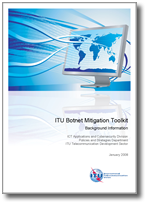
ITU Botnet Mitigation Toolkit
'Botnets', or as the media calls them, 'Zombie Armies' or 'Drone Armies', and their associated malware have grown over the years into a multimillion dollar criminal economy, a risk to government, critical infrastructure, industry, civil society and to the broader Internet community.
Botnets are coordinated groups of several thousand computing devices (such as PCs, laptops and even the new generation of mobile devices such as 'smartphones'), all infected with the same virus or other malware. Their collective computing power and Internet connectivity is harnessed into a collective whole and remote controlled for the performance of malicious and criminal activities.
Botnets are an illegal and unethical application of the concept of Distributed Systems, which has existed since at least 1970, in which multiple computing devices cooperate to achieve an integrated result... [Continue reading about this toolkit.]
|
|
|
|
ITU Publication on
Understanding Cybercrime: A Guide for Developing Countries
As cyber-threats can originate anywhere around the globe, the challenges are inherently international in scope and it is desirable to harmonize legislative norms as much as possible to facilitate regional and international cooperation.
To assist countries in understanding the links between cybersecurity, the building of confidence and security in the use of ICTs, and cybercrime, ITU has developed, and is in the process of developing, a number of tools. One
such tool, which ITU has developed together with an expert, is the ITU publication titled “Understanding Cybercrime:
A Guide for Developing Countries”. The Guide can serve to help
developing countries better understand the implications related to
the growing cyber-threats and assist in the assessment of the
current legal framework and in the establishment of a sound legal
foundation, if this does not yet exist.
DOWNLOAD the ITU Publication Understanding Cybercrime: A Guide for Developing Countries

[More ITU-D publications]
|
| 2007 Publications |
-
A Generic National Framework for Critical Information Infrastructure Protection (CIIP) (English)
This research paper prepared by ETH Zurich was commissioned by the ITU Corporate Strategy Division (CSD) and ITU-D ICT Applications and Cybersecurity Division (CYB). The objective of the study was to outline a simple framework that could be of interest to developing countries interested in establishing a national programme for critical information infrastructure protection (CIIP). The proposed framework is modeled after the Swiss Reporting and Analysis Center for Information Assurance (MELANI).
- Cybersecurity Guide for Developing
Countries (English),
Revised 2009
- Cybersecurity Guide for Developing Countries
2007 (English)
Non-finalized versions are also available in
عربي,
中文,
Français,
Русский and
Español. NB: A printed copy of this publication is available on
request.The Cybersecurity Guide for Developing Countries provides an introduction to this important topic, stressing what has changed with the advent of digital data, the virtualization of information and the widespread use of telecommunication networks. The stakes, in terms of the growth of societies, are presented in order to introduce the notion of a security imperative in the world of IT and telecommunication (cybersecurity).
[More ITU-D publications]
|
| Previous Publications |
A Handbook on Internet Protocol (IP)-Based Networks and Related Topics and Issues (عربي, 中文, English, Français, Español, Русский) , 2005 , 2005 The Essential Report on IP-Telephony (عربي, Español, Français)  , 2003 , 2003 e-Strategies Brochure (التنمية التمكينية, 为发展增添力量, Empowering Development, Au service du Développement, Содействие развитию, Medios para facilitar el Desarrollo)  e-Strategies Poster: Global e-Government Project - Enhancing Government Services Through the Use of Secure and Trusted Internet Infrastructures and Applications 
e-Strategies Posters: Empowering Development
Legislación sobre comercio electrónico en los países miembros de la Comunidad Andina. Análisis comparativo. Recomendaciones para su armonización  , 2002 & Cuadro comparativo de los textos legales sobre comercio electrónico de los Países Miembros de la Comunidad Andina Annex A, Annexes B & C , 2002 & Cuadro comparativo de los textos legales sobre comercio electrónico de los Países Miembros de la Comunidad Andina Annex A, Annexes B & C  e-Strategies Brochure: An Entry Ramp to the e-Society  , 2002 , 2002 - ITU: Legal Framework on e-Commerce, Digital Signatures, e-Certification, e-Transactions, CAs and RAs
 , 2001 , 2001
- Article: Bridging the Digital Divide
 , 2001 , 2001
ITU: e-Business - A Technology Strategy for Developing Countries, 2000 ITU: Guide on Managing and Developing Network Connections and Interconnections to the National Internet Nodes  , 2000 , 2000 UIT: Guide de gestion et développement des connexions et interconnexions des réseaux aux noeuds nationaux d'Internet  , 2000 , 2000 - Business Briefing: An Analysis of Electronic Commerce and Perspectives on the Future
 , 1999 , 1999
ITU: Public IP Address Allocation and Assignment in Africa, Technology Summit, ITU Africa Telecom  , 1998 , 1998 [More ITU-D publications]
|
|
|
|
|
| Newslog |
|
|
| |
| Projects and Resources |
|
[More ITU-D resources]
|
| |
| Publications and Papers |
- IMPACT
(International Multilateral Partnership Against Cyber Threats)
- ITU Cybercrime Legislation
Resources: ITU
Publication on Understanding Cybercrime: A Guide for Developing
Countries (Available for download now!)
-
ITU Publication on ICTs for
e-Environment - Guidelines for Developing Countries, With a Focus on Climate Change, 2008
-
ITU Publication on Electronic Government for Developing Countries, 2008
- ITU and ETH Zurich:
A Generic National Framework for Critical Information Infrastructure Protection (CIIP), 2007
- Cybersecurity Guide for Developing Countries
(English)
- Cybersecurity Guide for Developing Countries (English), 2007. Non-finalized versions are also available in
عربي,
中文,
Français,
Русский and
Español.
NB: A printed copy of this publication is available on
request.
- Cybersecurity Guide for Developing Countries (English,
Français), 2006
[More ITU-D publications]
|
| |
|



